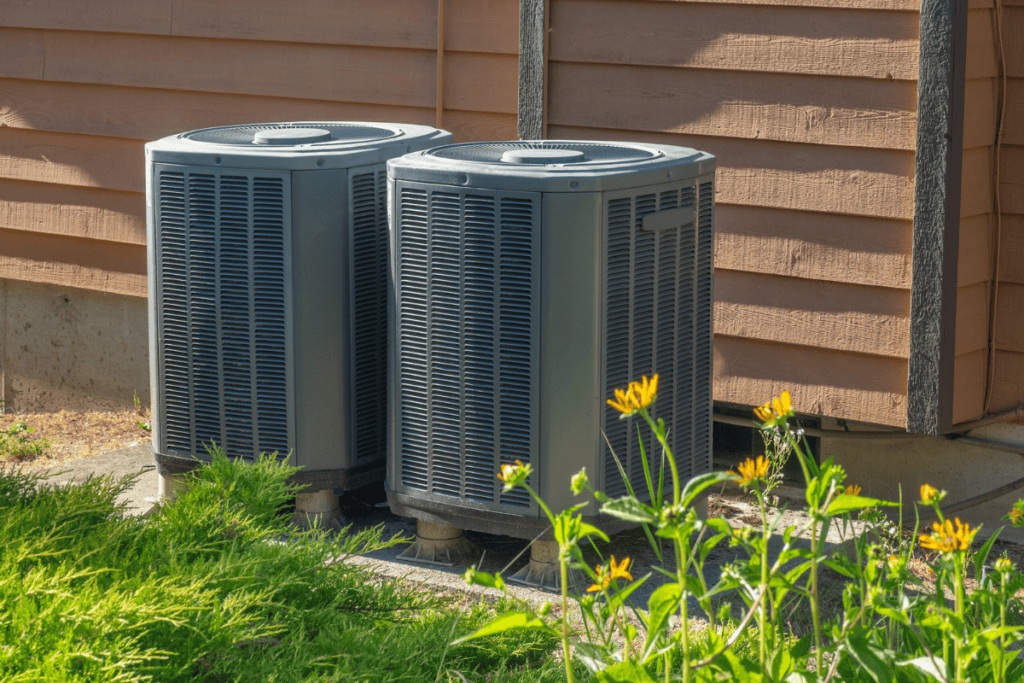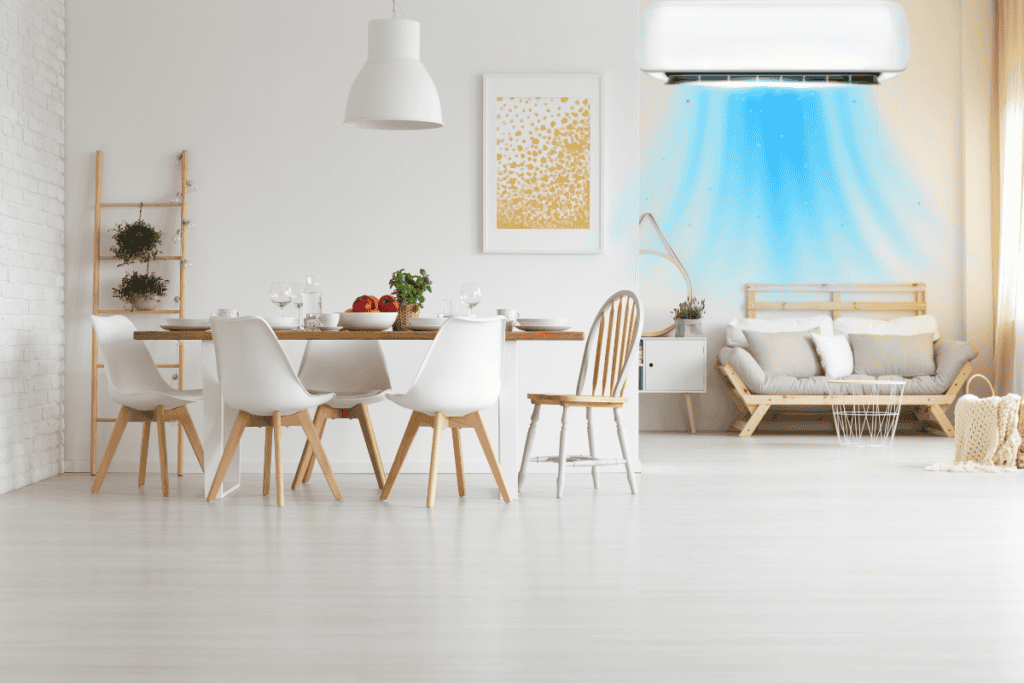Have you ever wondered if a dirty air filter can affect your AC’s efficiency? The answer is a resounding yes! Your air conditioner’s air filter plays a vital role in the proper operation of your AC system, yet it is often the most ignored item when it comes to maintenance. A clogged filter can cause your AC to work harder than necessary, leading to reduced efficiency and higher energy bills.
Imagine your air conditioner as the lungs of your home, breathing in air and cooling it before circulating it back into your living spaces. Now, picture those lungs trying to breathe through a clogged, dirty filter. Just as you would struggle to breathe with a cloth over your mouth, your AC struggles to draw in air when the filter is dirty, causing it to work overtime to maintain the desired temperature.
The United States Department of Energy notes that simply replacing a dirty filter can improve your AC’s energy efficiency by 5-15%, saving you money on your energy bills. In this article, we’ll explore the ways in which a dirty filter affects your AC’s performance and what you can do to keep your system running smoothly.
Contents
- 1 How Does a Dirty Air Filter Impact Your AC System?
- 1.1 1. Short Cycling
- 1.2 2. Reduced Airflow
- 1.3 3. Overworking of the AC Unit
- 1.4 4. Reducing Lifespan of Air Conditioning System
- 1.5 5. High Energy Bills
- 1.6 6. Frozen AC
- 1.7 7. Uneven Cooling
- 1.8 8. Poor Air Quality
- 1.9 9. Visible Dust Around Vents
- 1.10 10. Increased Dust in the Home
- 1.11 11. Ice Buildup On Coils
- 2 How to Clean Your Air Filter?
- 3 Prevention Tips for Maintaining a Clean Air Filter
- 4 Reusable Air Filter Vs Disposable Air Filter
- 5 Clean Air? HVAC Angel Is The Choice
- 6 Frequently Asked Questions
How Does a Dirty Air Filter Impact Your AC System?
A dirty air filter leads to more problems than you think. Clogged air filters can lead to poor air quality, higher energy bills and overworking of your system. Let’s explore all the impacts a clogged filter can have on your system, so that you can recognize these signs and clean your filter before the problem worsens.
1. Short Cycling
Your air conditioner is designed to cycle on and off throughout the day to maintain the desired temperature. However, a dirty air filter can cause those cycles to become more frequent than necessary. When the filter is clogged, it restricts the amount of air that can pass through, causing your AC to work harder and cycle more often.
2. Reduced Airflow
A clogged air filter will restrict the flow of air through your system. As the filter becomes clogged with dust, dirt, and other particles, it becomes more difficult for your air conditioner to push air through the filter and into your home. This reduced airflow can cause your AC to struggle to maintain the desired temperature, leading to longer cooling cycles and increased energy consumption.
3. Overworking of the AC Unit
When a dirty ac air filter restricts airflow, your air conditioning system has to work harder to cool your home. This extra strain on the system can cause it to overheat, potentially leading to a breakdown. An overworked AC unit is also more likely to experience premature wear and tear, reducing its overall lifespan.
4. Reducing Lifespan of Air Conditioning System
The added stress placed on your system by a dirty filter can have long-term consequences. As the system works harder to produce cold air, it can lead to early wear and tear of various components, such as the compressor, fan motor, and evaporator coil. By regularly replacing your filter, you can help extend the life of your system and avoid costly repairs.
5. High Energy Bills
When your air conditioner has to work harder due to a clogged filter, it consumes more energy to provide the desired cooling. This increased energy consumption can lead to higher utility bills, costing you more money in the long run. By simply replacing your filter regularly, you can help your AC run more efficiently, saving you money on your energy bills.
6. Frozen AC
When a jammed filter restricts airflow, it can cause moisture to collect on the evaporator coils. As the moisture builds up and the coils become colder, ice can form on the surface. A frozen AC unit is a clear sign that your filter needs to be replaced. If left unaddressed, this issue can lead to more severe problems, such as compressor failure, which can be costly to repair.
7. Uneven Cooling
A dirty ac filter can cause uneven cooling throughout your home. As the filter becomes clogged, it can restrict airflow to certain areas, leading to hot and cold spots. This can make some rooms feel stuffy and uncomfortable while others are too cold.
8. Poor Air Quality
A jammed filter can have a significant impact on your air quality. As the filter becomes clogged with dust, dirt, and other particles, it can no longer effectively trap these contaminants. This can cause allergens to build up in your home, leading to respiratory issues and other health problems.
According to the Centers for Disease Control and Prevention (CDC), a blocked filter can also contribute to the growth of mold and mildew, which can trigger allergies and other symptoms.
9. Visible Dust Around Vents
If you notice a buildup of dust and debris around your air vents, it’s a clear sign that your filter is dirty. When the filter is blocked, it can allow dust and other particles to bypass the filter and circulate through your system. This can cause visible dust accumulation around your vents, indicating that it’s time to replace your air filter.
10. Increased Dust in the Home
In addition to visible dust around your vents, a blocked filter can lead to an overall increase in dust throughout your home. As the filter fails to trap dust and other particles effectively, these contaminants can circulate through your living spaces, settling on furniture, floors, and other surfaces.
If you find yourself dusting more frequently than usual, it may be a sign that your filter needs to be replaced.
11. Ice Buildup On Coils
Similar to the issue of a frozen AC unit, a blocked air filter can cause ice to build up on your system’s evaporator coils. As the filter restricts airflow, the coils can become too cold, causing moisture in the air to freeze on the surface.
This ice buildup can prevent your air conditioner from effectively absorbing heat from the air, leading to reduced cooling performance and damaging the compressor.
These signs can help you recognize when it is time to change your filter. So, it is important to keep an eye on them.
How to Clean Your Air Filter?
Cleaning your air filter is an important part of maintaining your system and good indoor air quality. Here’s a step-by-step guide on how to clean your air filter:
1. Turn Off the Power and Locate the Filter
Locate the main switch or circuit breaker that controls your air conditioner and switch it off. Once the power is off, locate the air filter, which is typically found in the return air grille or the blower compartment of your unit.
2. Vacuum the Air Filter
Using a vacuum cleaner with a soft brush attachment, gently remove any loose dust and debris from the surface of the air filter. Be sure to vacuum both sides of the filter, paying extra attention to any areas with visible buildup. This step helps to remove the majority of the dirt and dust trapped in the filter, making the next step more effective.
3. Wash the Filter with Vinegar and Water
In a large sink or basin, mix equal parts of white vinegar and warm water. Submerge the air filter in the solution and let it soak for about 15 minutes. The vinegar helps to break down any stubborn dirt and grime, while also killing any mold or bacteria that may be present.
After soaking, gently scrub the filter with a soft-bristled brush to remove any remaining debris. Rinse the filter thoroughly with clean water to remove any remaining vinegar and dirt.
4. Let Dry and Replace
After washing, place the filter in a clean, dry area with good ventilation, and allow it to air dry for several hours or overnight. Do not use a hair dryer or any other heat source to speed up the drying process, as this can damage the filter material of your air conditioning system.
Once the filter is completely dry, carefully place it back into the return air grille or blower compartment, making sure it is securely in place. Turn the power back on to your system and let your air conditioner run to monitor its performance.
Prevention Tips for Maintaining a Clean Air Filter
1. Buy The Right Air Filter
When purchasing an air filter for your system, it’s suggested to choose one with good efficiency and a higher MERV rating. A higher MERV rating indicates that the filter can capture smaller particles, improving the air quality of your home. However, be sure to consult your system’s manual or a professional to ensure that you select a filter that is compatible with your unit.
2. Switch To Pleated Filter
Pleated filters are made from pleated cloth or paper that is folded in a series of small pleats. This design helps to increase the filter’s surface area, allowing it to capture more particles and improve its overall efficiency. By switching to pleated filters, you can help keep your system running smoothly and maintain better air quality.
3. Change Your Filters Regularly
Regular filter replacement is important for maintaining a clean and efficient system. According to the U.S. Department of Energy, you should clean or buy a new filter every month or two during seasons of peak use.
This helps to prevent dirt and debris from accumulating on the filter, which can restrict airflow and cause your system to work harder than necessary.
4. Clean Your Air Filters Regularly
If you have a reusable air filter, it’s important to clean it regularly to maintain its effectiveness. Follow the manufacturer’s instructions for cleaning your specific filter, which may involve vacuuming, washing with water and mild detergent, or a combination of both. Regular cleaning helps to remove any trapped dirt and debris, so that your filter can continue to trap particles effectively.
Reusable Air Filter Vs Disposable Air Filter
When it comes to choosing between reusable and disposable filters, there are several factors to consider. Here’s a comparison of the two types of filters:
| Feature | Disposable Air Filters | Reusable Air Filters |
|---|---|---|
| Availability | Widely available | Less common |
| Lifespan | Single-use | 5-10 years |
| Replacement/Cleaning | Easy, quick replacement | Easy, quick cleaning |
| Environmental Impact | Non-recyclable | More eco-friendly |
| Initial Cost | Lower | Higher |
| Long-term Cost | Higher | Lower |
| Filtration Effectiveness | Varies by type | Generally effective |
Clean Air? HVAC Angel Is The Choice
Maintaining clean air in your home is primary for the health and comfort of you and your family. While it’s important to regularly clean or replace your air filter, sometimes professional help is necessary to ensure your HVAC system is functioning at its best. That’s where HVAC Angel comes in.
At HVAC Angel, we understand the importance of indoor air quality and the role that your HVAC system plays in maintaining a healthy living environment.
When it comes to air filters, our experts can help you choose the right type of filter for your specific HVAC system, taking into account factors such as MERV rating, compatibility, and your home’s unique needs.
Trust the professionals at HVAC Angel to provide the expert guidance and services for all your heating and cooling needs. Contact us today to schedule your appointment and breathe easier knowing that your home’s air is in the best possible care.
Frequently Asked Questions
1. Can I run my AC with a dirty filter?
While it is possible to run your air conditioner with an unclean filter, it is not recommended. A dirty air filter can restrict airflow, causing your AC to work harder damaging to your HVAC system.
2. Why is my air filter black after 2 days?
A black air filter after just 2 days is a sign of soot build-up, also called “black soot deposition”. It is important to identify and address the source of the problem and replace your filter immediately.
3. Can Air conditioner run without filter?
No, it is not recommended to run your air conditioner without a filter. The filter helps to trap dust, dirt, and other particles, preventing them from entering your HVAC system and causing damage.
4. What happens if you haven’t changed your AC filter in years?
If you haven’t changed your air conditioner’s filter in years, it is likely heavily clogged with dirt, dust, and other debris. This can severely restrict airflow, causing your AC to work harder and leading to system failures.

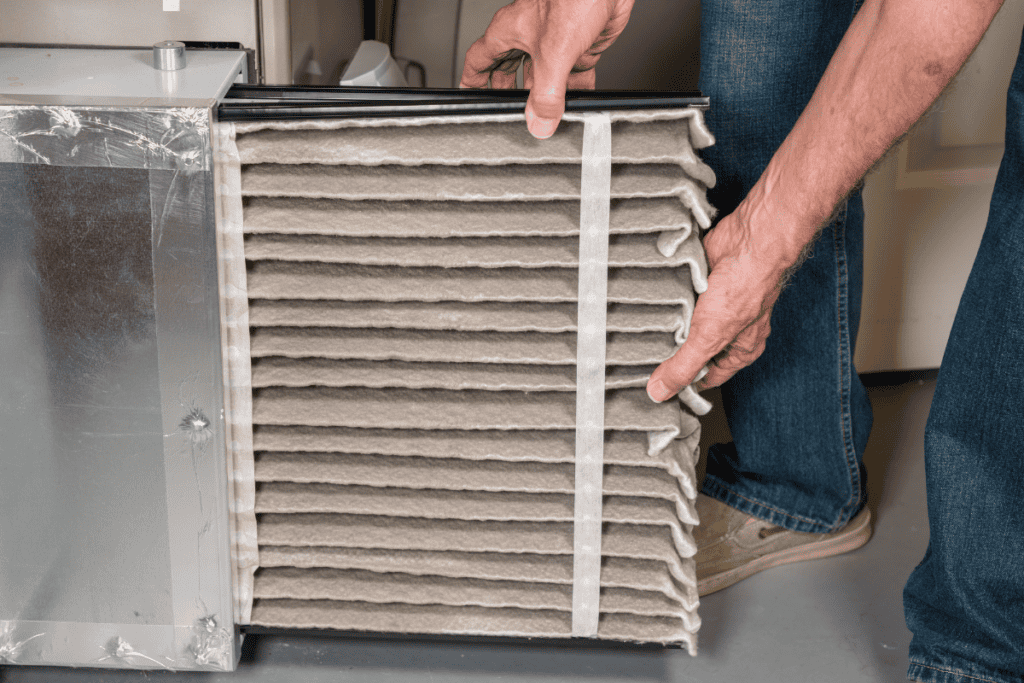

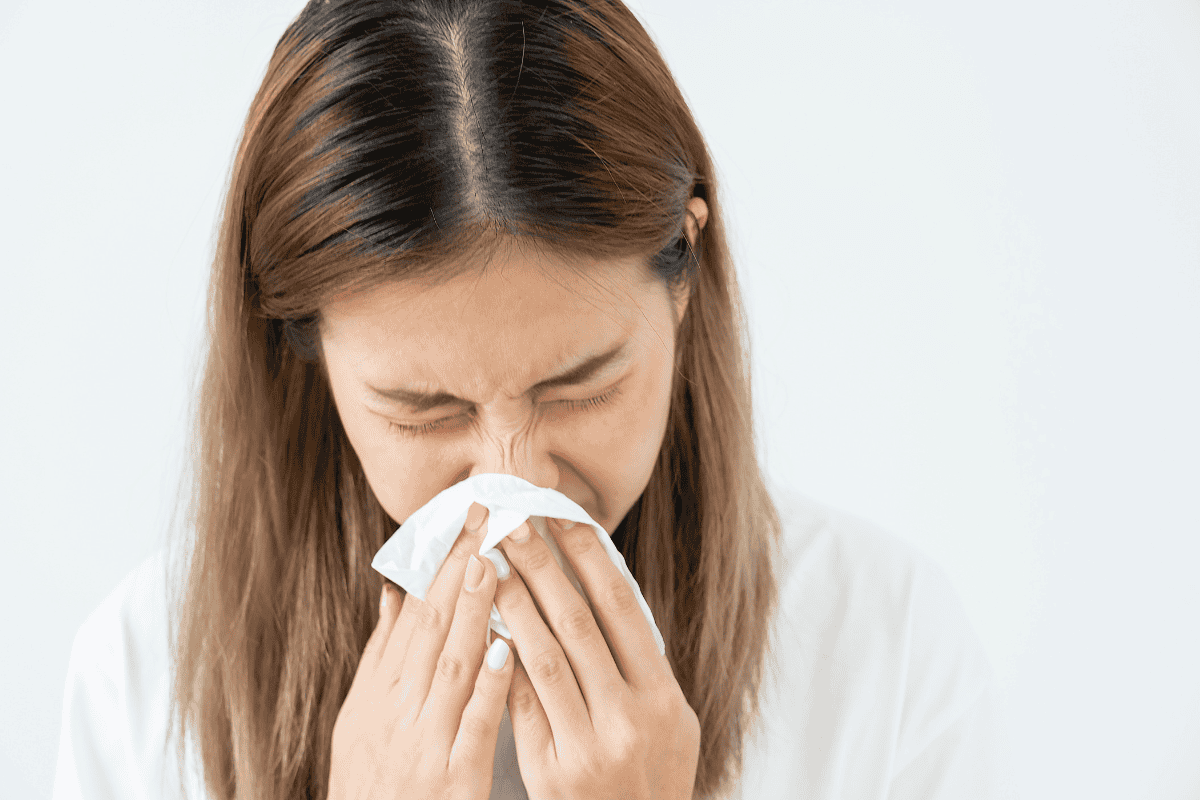
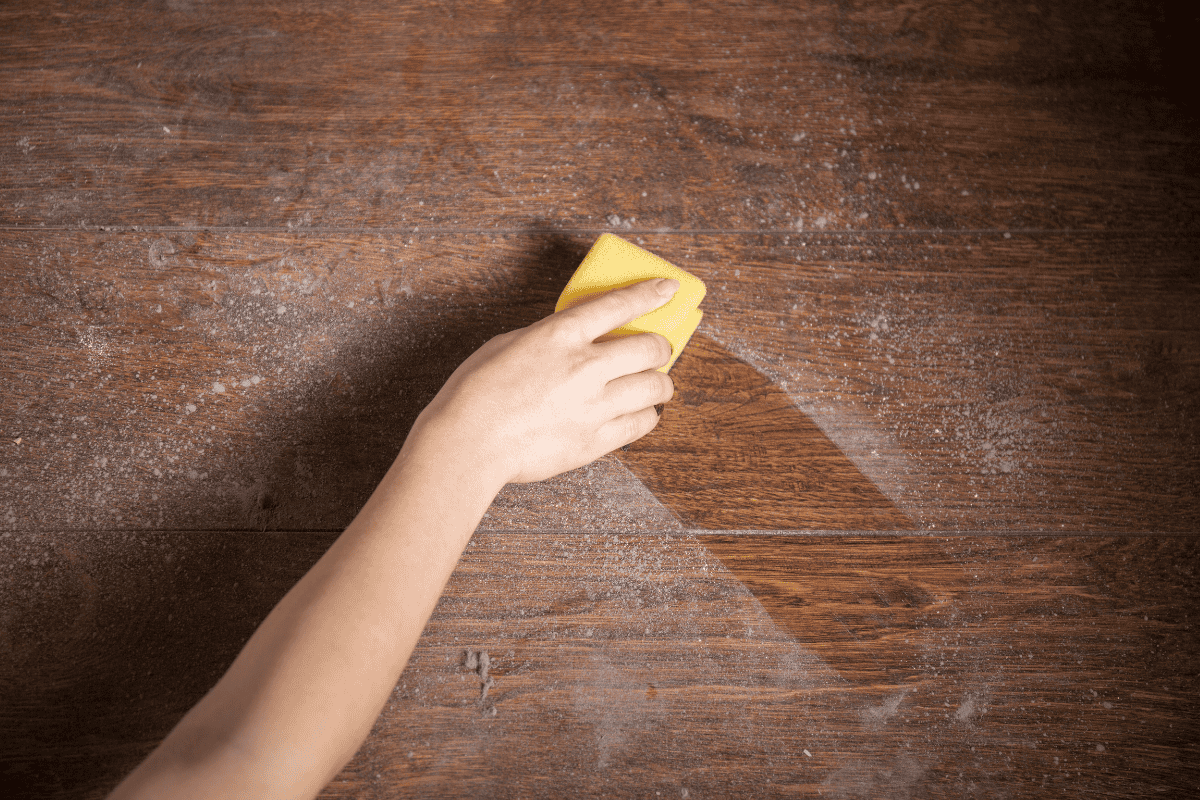

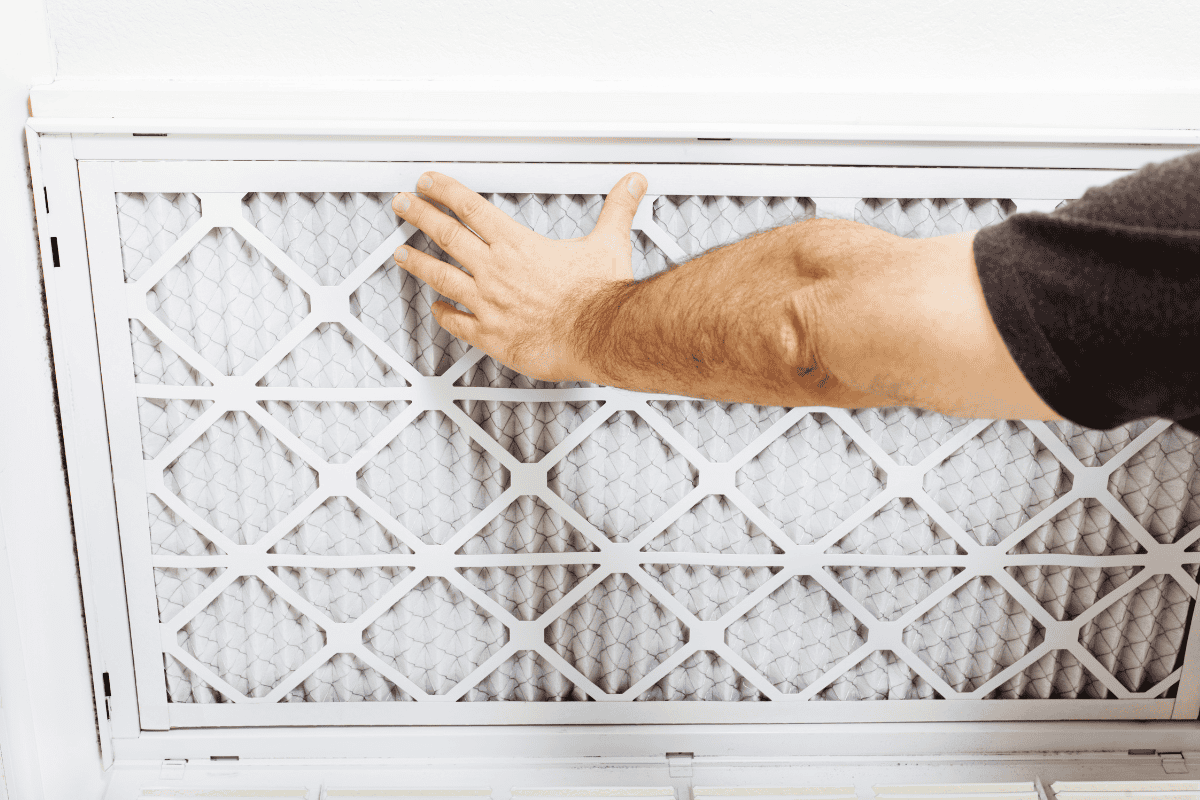
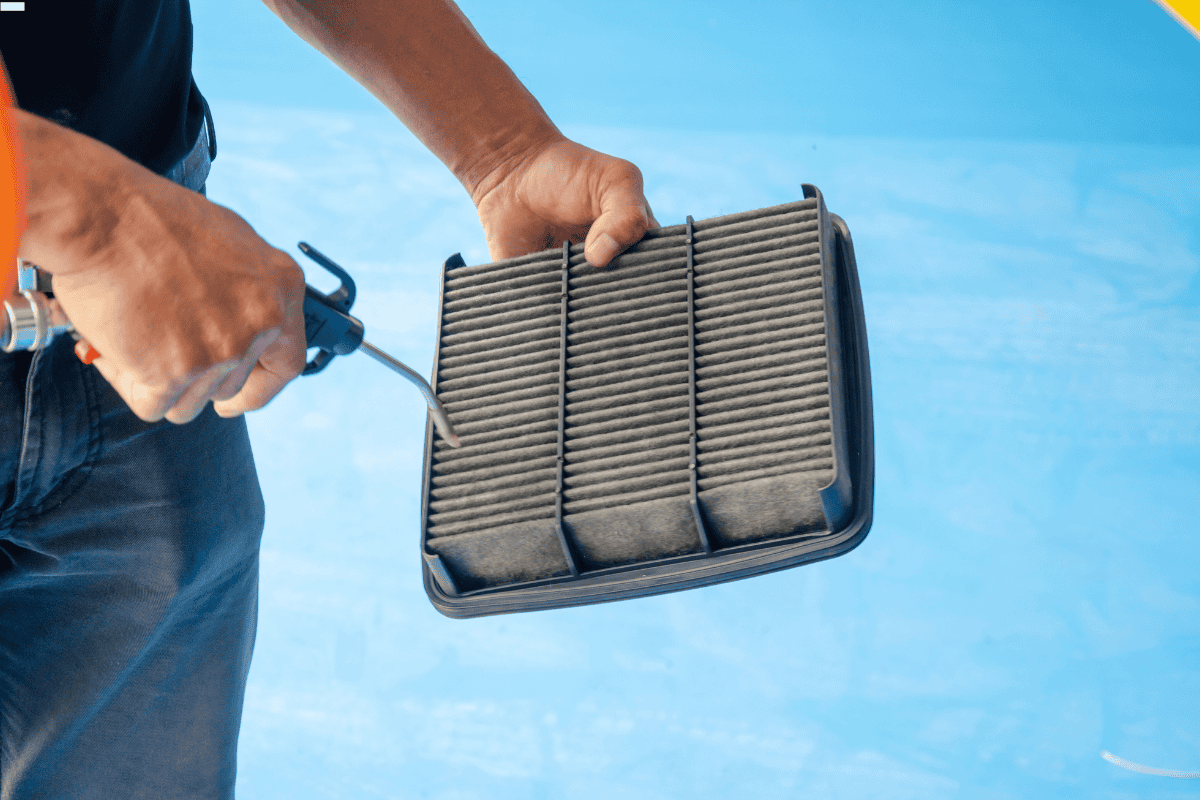
![9 Reasons That Causes an AC Unit to Freeze Up: [Troubleshooting Guide]](https://hvacangel.com/wp-content/uploads/2024/05/what-causes-a-ac-unit-to-freeze-up-1024x683.png)
